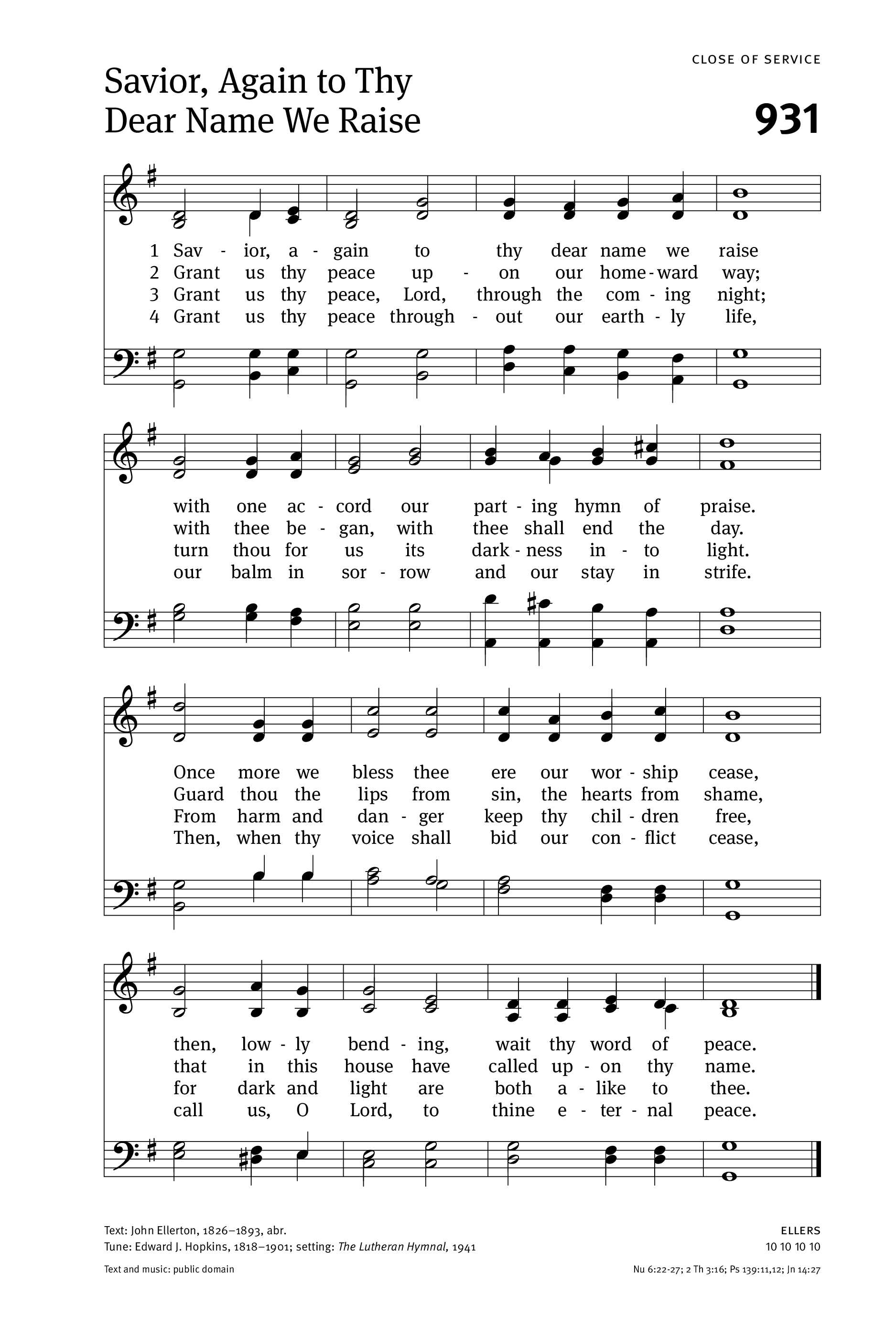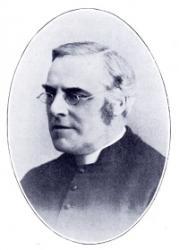Savior, Again to Thy Dear Name (Parting Hymn)
Lyrics
with one accord our parting hymn of praise.
Once more we bless thee ere our worship cease,
then, lowly bending, wait thy word of peace.
with thee began, with thee shall end the day.
Guard thou the lips from sin, the hearts from shame,
that in this house have called upon thy name.
turn thou for us its darkness into light.
From harm and danger keep thy children free,
for dark and light are both alike to thee.
our balm in sorrow and our stay in strife.
Then, when thy voice shall bid our conflict cease,
call us, O Lord, to thine eternal peace.
Bible Reference
Psalm 29.11
About This Hymn
Author – John Ellerton, 1826–1893
Composer – Edward J. Hopkins, 1818–1901
Tune Name – Ellers
Meter – 10 10. 10 10.
Scripture Reference – Psalm 29:11
“The Lord will give strength unto His people; the Lord will bless His people with peace.”
For centuries, the Christian Church has cherished the tradition of closing worship services with a hymn. This custom traces back to the time of Christ, when, following the Last Supper, Scripture tells us, “And when they had sung a hymn, they went out…” (Mark 14:26). Among the many hymns written for this sacred purpose, few have achieved the lasting esteem and spiritual beauty of John Ellerton’s parting hymn, written in 1866 for a choral festival in Cheshire, England. Recognized as one of the finest of all closing hymns, it was later included in the influential Anglican hymnal Hymns Ancient and Modern in 1868, cementing its place in worship traditions across generations.
John Ellerton, born in London in 1826, came from a devout evangelical background. After graduating from Cambridge University, he aligned himself with the more liberal or broad-church wing of the Anglican communion. Deeply engaged with the pressing social issues of his time, Ellerton emerged as a prominent voice among Anglican liberals, alongside figures such as Bishop William Walsham How. Despite these theological leanings, Ellerton maintained strong, respectful ties with the evangelical community, and was known for his ability to appreciate and value differing perspectives within the Church. Though his entire ministerial career was spent in modest parishes across England, his cultural depth, scholarly distinction, and personal character earned him widespread respect. He was revered by his congregants and peers alike, and considered an authority on hymnology during his lifetime. The renowned theologian Matthew Arnold once called him “the greatest of the living hymn writers.” Ellerton authored approximately eighty-four hymns, including ten translations from Latin. Reflecting his humility and devotion, he chose not to copyright any of his work, believing that if his hymns were found worthy to be sung in praise of Christ, he should only feel gratitude and humility.
The tune Ellers was composed in 1869 by Edward John Hopkins, one of England’s most accomplished church musicians. Born in London on June 30, 1818, Hopkins was well-regarded for his skill as both an organist and a composer. His musical setting for Ellerton’s text was originally arranged for unison singing, with a unique accompaniment for each stanza. The tune is noted for its masterful melodic structure—beginning with a gentle ascent to a peak at the midpoint, then descending softly to a peaceful conclusion. This melodic symmetry reinforces the hymn’s role as a benediction—offering both spiritual strength and a calm sense of closure at the end of worship. Together, Ellerton’s deeply reverent text and Hopkins’s refined musical composition have given the Church a parting hymn of enduring grace and beauty


📬 Subscribe to Our Devotional Updates
Receive weekly hymns, devotionals, and website features directly in your inbox.
Hymn Information

- Category: Hymn
- Author/Writer: John Ellerton (1866)
- Added: July 4, 2025
- Last Updated: July 4, 2025
- Views: 942
To view the author's biography, click their name above.
MIDI File
More Hymns by John Ellerton
Popular Hymns
Recent Blog Posts
Popular Blog Posts
Visit Us on Social Media
Latest from X (Twitter)
Tweets by HymnalLibraryLatest from Facebook
Latest on YouTube
Daily Bible Verse
Disclaimer
The hymns, sheet music, MIDI files, and related content on this website are provided for educational and research purposes only.
- Public Domain: Many of the hymns featured here are in the public domain and may be freely used.
- Copyrighted Works: Some hymns may still be under copyright protection. Where applicable, permission has either been requested from the copyright owner, or the content is shared under the principles of fair use for educational purposes.
⚠️ Important Notice: If you wish to reproduce, distribute, or use any copyrighted hymn beyond personal study or educational use, you must obtain permission directly from the copyright holder. This website does not grant any rights for commercial use yet.
If there is any other question please address it to us in our Contact Page, for further assistance. Thank you for using the site. May God Bless You.












